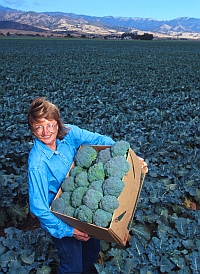Food scientists at Oregon State University in Corvallis find that a key enzyme in whole broccoli is better absorbed by the body than when offered in a supplement. Their research appeared last month in the Journal of Agricultural and Food Chemistry (paid subscription required).
Broccoli has attracted the interest of researchers because it contains high levels of certain glucosinolates, a class of phytochemicals — chemicals from plants — that may reduce the risk of prostate, breast, lung, and colorectal cancer. When eaten as a raw or lightly-cooked food, enzymes in the broccoli help to break down the glucosinolates into two compounds that appear to have anti-cancer benefits, sulforaphane and erucin.
An enzyme in broccoli called myrosinase is needed to break down glucosinolates, but is missing from most of the supplement forms of glucosinolates. Without this enzyme found in the whole food, the study found that the body actually absorbs five to eight times less of the key compounds.
The researchers, led by OSU’s Emily Ho, measured urinary metabolites of sulforaphane and erucin with liquid chromatography and tandem mass spectrometry. They found peak excretion of sulforaphane and erucin to be higher and occurring sooner in research subjects who consumed broccoli sprouts, compared to subjects who consumed the supplement.
While the team’s research centered on broccoli, which has the highest levels of glucosinolates, they are also found in other cruciferous vegetables, such as cauliflower, cabbage, and kale. As with broccoli, these vegetables should be eaten raw or at most lightly cooked (2-3 minutes) or steamed to retain adequate levels of the enzyme myrosinase.
Read more: Research-Based Healthy Eating Plate Unveiled
* * *


 RSS - Posts
RSS - Posts
You must be logged in to post a comment.